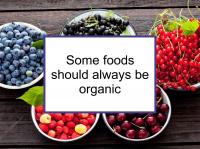Generally speaking, organically grown foods are preferable to conventionally grown because of superior flavor and nutrient content, little or no exposure to pesticides, herbicides, fungicides and chemical fertilizers, lower exposure to environmental contaminants and heavy metals, and little or no exposure to hormones and antibiotics.
- There is some evidence that organic fruits and vegetables have higher nutrient content than conventionally grown produce, however this is not always the case. Choosing beautifully ripened produce that has the appropriate color, texture and odor is as important as the “organic” label with respect to nutrient content.
- While it is plausible that pesticides and herbicides, which are designed to kill living organisms, could also be harmful to human beings, the evidence of a link to breast cancer risk or survival is limited. It is possible that the risk conferred by cumulative exposure to such chemicals over time is significant. The very high exposures experienced by those living near or working on farms (or in greenhouses) have been linked to increased breast cancer risk.
- Industrial pollution residues in soils (found routinely in farmlands in India, China and elsewhere) and naturally-occurring heavy metals (such as cadmium) in some soils can result in the uptake of endocrine disruptors and frank carcinogens by some plants.
- Cattle, sheep and lambs, pigs and farmed fish typically are raised using hormones and/or antibiotics that become incorporated in their meat and, in the case of cows, milk. These chemicals typically cannot be washed off, nor does soaking or cooking the foods always improve their profiles.
- There is growing evidence that women who for the most part consume organic food have lower risk of breast cancer than those that do not, although not all studies are in agreement.
Organic foods are relatively expensive and not always available. Therefore, it is important to know which foods should normally be purchased organic.
Guidelines concerning when to select organic
Produce grown outside the U.S. or Canada (e.g., Mexico, China) should be purchased organic. This is because regulations and standard practices can be dramatically less protective of consumers in other countries and we have no ability to evaluate this possibility. (On the other hand, there are European countries with stricter rules — in some cases we export our best, least contaminated produce to them, leaving the inferior remainder to U.S. consumers.)
Adulteration of herbs and spices is prevalent throughout the world. For example, Hungarian paprika has been found in the past to be mixed with brick dust. Lead is another favorite admixture because of its weight. Whole spices are less likely to be deliberately contaminated that powdered spices. Heavy metal and aflatoxin contamination is also common, even in spices produced or packaged in the U.S.
Coffee and tea often are grown using a remarkable level of pesticides, herbicides, and fungicides.
Based on the above, the following guidelines can be used to identify foods that should be purchased organic: (1) fruits and vegetables with undesirable pesticide profiles; (2) foods grown in areas with high levels of industrial contamination or naturally occurring heavy metal concentrations in the soils; (3) produce grown in Mexico, China or elsewhere outside the U.S. or Canada; (4) non-U.S./Canadian herbs and spices; (5) coffee and tea; (6) meat, eggs and dairy products.
Foods and beverages to consume only if organic
The following recommended or neutral foods and beverages should be purchased organically grown, if possible. Note that foods to avoid are not covered.
- Açaí berries
- Apples
- Apricots, fresh or dried
- Arugula
- Basil
- Bell peppers
- Black cumin
- Black tea
- Blackberries
- Blueberries
- Carrots
- Celery
- Chamomile
- Cherries
- Chicken & turkey
- Cilantro
- Cinnamon
- Coffee
- Corn
Please read the applicable food webpages when making your own food lists since these pages contain important advice, food rankings (e.g., highly recommended, recommended in moderation), consumption limits, and other pertinent information.
USDA rules for organic farming
According to USDA rules, products labeled organic must have at least 95% certified organic content. Products labeled “made with” organic must have at least 70% certified organic content (the USDA organic seal may not be used on such products). Certified organic food must be made only with allowed ingredients and without excluded methods such as genetic engineering, ionizing radiation, or sewage sludge, and must be overseen by a USDA National Organic Program-authorized certifying agent.
